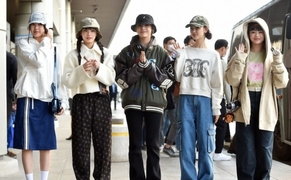 |
| Some lawmakers of the main opposition Democratic Party and representatives from farming groups shave their heads, demanding normalization of rice prices, at the National Assembly on April 3, 2023./ Photographed by Song Eui-joo |
AsiaToday reporter Lee Wook-jae
President Yoon Suk-yeol is strongly considering exercising his first-ever veto against a revision to the Grain Management Act, which the opposition-controlled National Assembly has passed. While the government defined the bill as an “anti-market populist bill,” attention is now focused on whether the president’s veto will be exercised for the first time in about seven years.
According to the presidential office on Monday, Yoon is considering exercising his right to reconsider the revision to the Grain Management Act as early as on Tuesday at a Cabinet meeting. The right to demand reconsideration is the president’s constitutional right to refuse acceptance and return it to the National Assembly if the Executive disputes the resolution of the National Assembly.
The revision requires the government to buy excess rice if production exceeds estimated demand by 3-5 percent, or if prices fall by 5-8 percent or more compared to the previous year.
The government estimates that the volume of surplus rice will reach 630,000 tons by 2030 and it will cost 1.4 trillion won (US$1.08 billion) to purchase it.
The National Assembly passed a revision to the Grain Management Act on March 23, which was sent to the government on March 31. Under Article 53 of the Constitution, a bill approved by the National Assembly can be promulgated by the President within 15 days of being transferred to the government. In case of objection to the bill, it can be returned to the National Assembly and demanded reconsideration. If Yoon exercises his veto power during the 15 days of the objection period, he can veto it at Cabinet meetings on the 4th and 11th. If Yoon vetoes the revision, it will be the first time in about 7 years that a president vetoes parliamentary legislation since then-President Park Geun-hye vetoed a revision to the National Assembly Act in May 2016.
The government believes that not only is the national financial burden, but the revision could induce excessive rice production. The government has collected opposition from farmers’ organizations, so there is no problem in exercising the veto. Last year, Yoon had said that such a law does not help either the farmers or the development of agriculture.
Lawmakers of the main opposition Democratic Party and representatives from farming groups The six members of the Democratic Party’s Agriculture, Food, Maritime Affairs and Fisheries Committee, including Rep. Shin Jung-hoon, Rep. Lee Won-taek, Kim Sang-min and Baek Hye-sook, are holding placards after shaving their heads, demanding normalization of rice prices at the National Assembly on April 3, 2023./ Photographed by Song Eui-joo
Six lawmakers of the main opposition Democratic Party and representatives from farming groups had their heads shaved, demanding normalization of rice prices at the National Assembly.
#grain bill #Grain Management Act #veto #Yoon Suk-yeol
Copyright by Asiatoday
Most Read
-
1
-
2
-
3
-
4
-
5
-
6
-
7





















